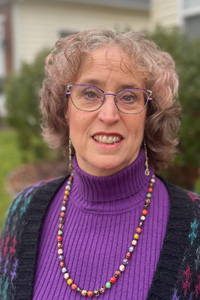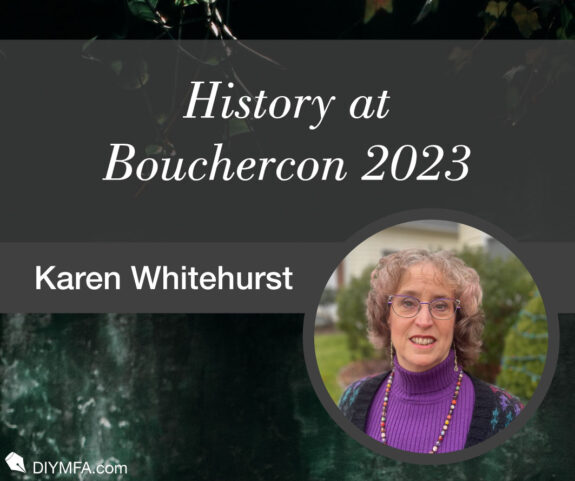Bouchercon is the annual world mystery convention, this year held in San Diego, California. Every conceivable form of mystery, suspense, and thriller novel, from teddy bear cozies to hard-boiled, and noir can be found here. This year’s convention brought together approximately seventeen hundred people for four and a half days of fun and crime at one of the great convention hotels, the San Diego Marriott Marquis, which is right on the harbor.
One morning, I got to watch a destroyer and a littoral combat ship being hauled down to the naval dockyards, from the hotel. Another morning, I opened the curtains to nothing but grey. The marine layer gave us a wall of impenetrable fog.
People write historical fiction to clear the fog of the present by seeing it through windows of the past. Historical fiction promotes the idea the past isn’t that foreign a country, that it isn’t as alien as we might think it is, that time gives distance. Many authors use the past as a creative play space to examine and work out their thoughts about contemporary issues. They also examine how people in the past attempted to resolve—or not—similar issues.
I’ve never held to the old saw that history repeats itself. It merely appears so because human nature and imagination are limited and fallible. Self-interest is the great limiting factor. In other words, always follow the money—solid advice in 17th-century Venice, 18th-century London, and 21st-century Shanghai.
Also, Ovidia Yu, who writes the Su Lin mysteries that take place in WWII Singapore, put it: however terrible the events of the past, people survived it. There was a way to tomorrow. In some senses, historical fiction gives hope.
History and historical fiction are interpretive arts, the latter more so than the former. A historian takes a multitude of primary sources (evidence from the period) to support an argument s/he makes about her/his research issue. Historical fiction authors do the same thing, with one additional burden—write an exciting story with good characters and snappy dialogue. Given how much crime, broadly speaking, exists in history, historical mystery is a natural sub-genre.
All writers of history fight the battle between what the sources say (accuracy) and what romantic fantasies and/or legends exist in people’s heads. How we’ve been taught to think about history—historiography—does get in the way. For a century or more, history was about singular or great white men (and a few spectacular women) doing great things. Authors have been beating that notion back for some time now. Novels featuring women, persons of color, or LGBTQ+ characters can now be easily found.
In crime fiction, however, one thing remains the same—all sleuths must have the agency to solve the crime.
Another aspect of historiography—there’s an old idea that history progresses from point A to point B in a linear fashion (teleology). Well, no, it doesn’t. It’s more like a dance with one step forward, two to the side, one back, and then start the box over. Case in point—people today don’t necessarily want to remember that many PI novels of early 20th century dealt with anti-labor law, unequal divorce laws, industrial espionage, and religious con men and other grifters.
(For that last, see The Dain Curse by Dashiell Hammett and Nightmare Alley by William Lindsay Gresham, twice made into a movie).
How accurate should historical fiction be? I agree with Vanessa Riley, the author of The Queen of Exiles and the Lady Worthing Mysteries: We owe it to our children to be as accurate, as sourced, and as diverse as possible. She was speaking directly to the erasure of Black history (The Queen of Exiles is about the queen of Hayti, who was forced to flee to England when her husband was overthrown as part of the Haitian Revolution, which was a much six-sided civil war as it was a revolution.) The principle, however, holds in any context, even though, in writing, about 90% of research won’t make it into the book.
Women in any century have frequently had power, but usually not public power—that last is, mostly, a manifestation of the 20th century. (Those few spectacular women in the official record, like Elizabeth I of England or Isabella of Castile, might have something to say about that.) Still, most women, even wealthy women, held what’s called “soft” power.
Richard Koreto, who writes the Alice Roosevelt novels and the Lady Frances Ffolkes mysteries, discussed how the Empress of China, Cixi, saw Alice Roosevelt as an American princess, a woman from a powerful family, and gave her equal status that helped bridge a cultural and diplomatic divide. Men couldn’t deal directly with the Empress, but Alice could and was, therefore, a means to convey American desires to the Chinese.
Overall, the authors had some advice and some warnings for would-be writers of historical mysteries—Historical facts form the skeleton of the story, but the fiction is the flesh, wherein you’re seeking the truth of the moment; The closer to now that you get, the more you have to watch out for the relatives of your historical characters; Get it as right as possible, especially with the real life people and places; Local museums and historical societies are huge resources, so make research librarians your best friends.
Visit, if you can, the places where you’ve set your story because this will enhance both setting and character; Sources of choice—the actual places you’ve set the story (foot research); talk to people (if you can); newspapers and magazines (if they existed), novels of the period; personal records such as letters, diaries, household account books; government records such as trial transcripts, tax rolls, terriers (medieval land surveys), census data, actual legislation; Double-check everything and use multiple sources/perspectives to get the fullest possible picture, for the simple reason that not everything you read is correct. (Every source has its own POV.)
I don’t agree that less is more in the historical detail. A writer needs exactly as much detail as is necessary to make the picture clear and the character real, yet keep the story moving. History is complicated, and it matters, so don’t give it such short shrift as to make it vague, inaccurate, or useless.
Do you need to include a bibliography? For those readers who get interested in the period through your book, it’s a convenient resource for them. Also given the times in which we live, It can also help reduce challenges to your novel, which is another reason not to use too little historical detail.
Reading historical fiction and going to conferences such as Malice Domestic and Bouchercon can help you get over any intimidation or hesitation you might feel about writing your own historical novel. Such conferences can hook you up with people in the field—authors, agents, publishers, and readers—who can be a great help to you. All you gotta do is go and seek and ask.

A former college professor, Karen Whitehurst holds a Ph.D. in British history from the University of Virginia. She currently resides in Maryland with one long-suffering husband, three naughty cats, and over one hundred houseplants. A writer of both historical mystery and SF & F, she is currently at work on a mystery set in 18th century England during the Gordon Riots.
For more information, visit her website.







